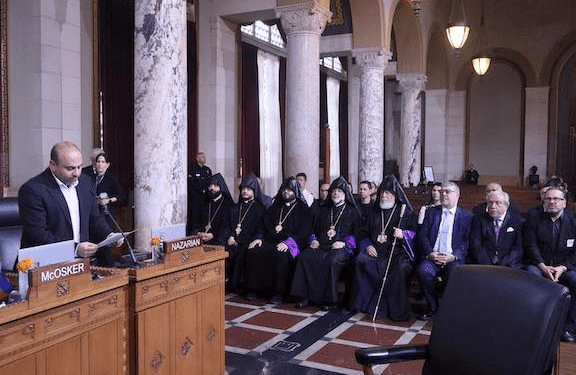Los Angeles City Council Welcomes Catholicos Aram I

Councilmember Adrin Nazarian welcomes Catholicos Aram I to L.A. City Council on Oct. 28
The Los Angeles City Council on Tuesday welcomed His Holiness Aram I, Catholicos of the Great House of Cilicia, who spoke at during the council’s session and highlighted the importance of public service.

The Catholicos was invited to the City Council by Councilmember Adrin Nazarian, who hosted a breakfast reception prior to the council meeting. Nazarian greeted the pontiff at the entrance of City Hall and escorted him to the Mayor’s Press room for the reception.
Welcoming the Catholicos to the reception were Council President Marqueece Harris-Dawson and L.A. City Council President Emeritus Paul Krekorian, who had hosted a similar event during Aram I’s last pontifical visit in 2016.

Accompanying the Catholicos were Western Prelate Archbishop Kegham Khacherian, the pontiff’s scepter bearer Reverend Sarkis Aprahamian, Bishop Dajad Ashekian, the Chancellor of the Catholicosate and Reverend Hovaguim Panjarjian. Also joining the pontiff’s entourage were the co-chairs of the Catholicosate Central Executive Council, Krikor Mahserejian and Stepan Der Bedrosian. The Western Prelacy Executive Council was represented at the event by Jack Hadjinian and Sarkis Tatikian.
Attending the event were representatives of various community organizations, among them Armenian Revolutionary Federation Western U.S. Central Committee member Armen Hovannisian.
During the reception Krekorian, who now runs the Mayor’s office for special events, briefed the Catholicos on the city’s plans to host the 2026 World Cup and the 2028 Olympic Games. The pontiff acknowledged the mammoth responsibility and voiced confidence that both events would be successful due to the capabilities and capacity of the City of Los Angeles.
Talk then turned to the importance of uniting the Armenian community in the face of challenges facing the Armenian Nation following the 2020 Artsakh War.
The Catholicos pointed out the imperative to civic and political engagement by all voters in Los Angeles, especially those in the Armenian-American community.
The Catholicos carried the same message of unity and propelling youth involvement to his remarks at the City Council chambers, as councilmembers listened to his inspiring message.

Before the Catholicos was invited to the dais, Councilmember Nazarian not only praised Aram I for his leadership but also emphasized that this year marks the 30th anniversary of his enthronement as Catholicos of the Great House of Cilicia.
Nazarian pointed out that amid centuries of turmoil for the Armenian people, which have included invasions, conquest, wars and the Genocide, the Armenian Church has stood as the singular institution that has cared for generations of Armenians who survived those travesties and atrocities.
The councilmember especially underscored the role the Armenian Church played in rescuing and nurturing survivors of the Armenian Genocide, proclaiming that without shouldering such a critical undertaking, Armenians would not have a homeland today.

In welcoming Catholicos Aram I to the City Council chambers, Nazarian called him a “true global leader.”
“From guiding his community through the Lebanese Civil War to becoming the youngest moderator of World Council of Churches, his life has been one of service and courage. For three decades, he hasn’t just led; he has built. He has established museums, seminaries, youth centers, orphanages, and schools — ensuring the Armenian heritage thrives and that the most vulnerable are cared for. Los Angeles is honored to host you!” Nazarian said.
In his brief yet poignant remarks, the Catholicos emphasized the importance of service to the people and commended the Los Angele City Councilmembers for working to advance the aspirations of their constituents, while leading the “City of Angels.”
He also expressed his satisfaction at seeing so many young faces on the City Council, emphasizing the need for young leaders to shape not only the future, but also the present.
“The youth,” the Catholicos said, “should not be viewed as the future, but rather the present.”





